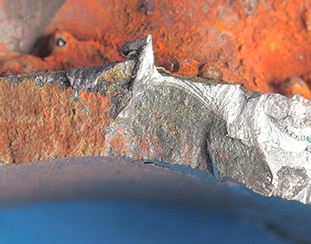|
Hot (Solidification) Cracking – Definition, Process and Tests
 What is Hot Cracking?
What is Hot Cracking?
Hot cracking (also known as solidification cracking) is the formation process of shrinkage cracks during the solidification period of a weld metal.
How does Hot Cracking Occur?
This process takes place in the fusion zone of a weld. It occurs when the supply of liquid weld metal available is not enough to fill the spaces between the solidifying weld metal opened up by shrinkage strains.
The cracks form either immediately after the welds are created or when welds are in progress. Depending on the location and conditions where the cracks form, they can be divided into solidification cracks (SC) when they form in the weld metal or liquation cracks (LC) when they form in heat affected zones.
Factors Affecting Hot Cracking
- The force/strain on the weld pool is high
- A blockage or insufficient supply of weld liquid (filler metals/material) prevents areas being reached
- Impurities are present
- High temperature conditions (1200 degrees Celsius)
How do you stop Hot Cracks?
Hot cracking can be prevented through the implementation of different techniques. These include:
- Reducing heat input
- Reduce the strain put onto the solidifying weld metal
- Material selection
- Use of appropriate welding procedures and welding parameters
What Causes Weld Cracking?
Weld cracking is caused by various processes including rapid cooling, internal stresses being exceeded either by the weld or base metal (or the combination of both).
What is the Relevance of Hot Cracking?
Hot cracking is prevalent in the process of welding and can have many industrial implications if not monitored or mitigated effectively. TWI Ltd has extensive experience with researching and working to prevent hot cracking. Examples include:
TWI has knowledge in the occurrence of hot cracking in stainless steels and austenitic stainless steels.
TWI carried out a project looking into the cause of failure of an industrial gas turbine which involved looking at the consequences of hot cracking occurring.
TWI is researching the potential uses of Altair Inspire Cast to help predict temperature distribution to predict regions where hot cracking may occur.
TWI has produced a report looking into ‘Laser Welding of Crack Susceptible Materials Using Tailored Energy Distributions.’ The report looks into the hot crack susceptibility of materials and the processes involved.
TWI report looks at the procedures for reducing solidification cracking in CO2 laser welds in structural steel.
A report produced by TWI investigates the factors affecting solidification cracking during electron beam welding.
